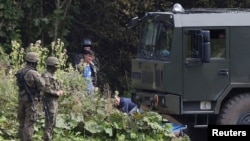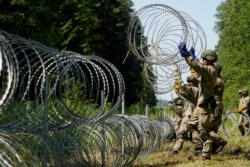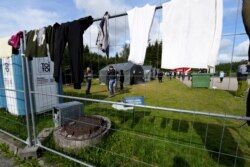European ministers expressed concern Friday over the growing number of migrants illegally crossing from Belarus into several Baltic states, saying Minsk is intentionally facilitating their crossing to politically destabilize those countries and distract from human rights abuses at home by the Lukashenko regime.
"They have been luring thousands of third-country nationals to Belarus, issuing them tourist visas, bringing them to the European Union-Belarus border and forcing them to illegally cross to neighboring countries," Estonian Foreign Minister Eva-Maria Liimets told a virtual informal meeting of the U.N. Security Council that her nation organized.
"The objective of the authorities of Belarus with this hybrid action and manipulation of human beings has been to destabilize its neighboring countries and divert attention from increasing human rights violations in Belarus," Liimets said.
Minsk denied the accusation.
"Belarus did not orchestrate the refugee crisis on its western borders," Belarusian Ambassador Valentin Rybakov told the meeting. "Belarus did not violate its obligations towards refugees who seek asylum in Western countries."
Rybakov said Minsk is willing to cooperate with international organizations to resolve the situation.
The migrants, many of them from Afghanistan, Syria, Iraq and Iran, seek asylum when they reach European Union member states.
Their journeys are not without peril. In September, the International Organization for Migration said four migrants died near the border between Poland and Belarus. At least two of them appeared to have died of hypothermia, raising additional concerns for the safety of migrants as winter approaches.
The IOM expressed concern that migrants were being turned back at EU borders, leaving groups of people stranded for weeks without assistance.
European and especially Baltic ministers blamed Belarusian President Alexander Lukashenko for repression in his own country and accused him of manufacturing a new migration crisis.
After a contested election in August 2020, which Western nations said was rigged in his favor, Lukashenko tightened his nearly 30-year grip on power, cracking down on protesters, activists, human rights defenders and journalists in Belarus.
The head of the U.N. Human Rights Office in New York, Ilze Brands Kehris, told the meeting that the office had received reports of more than 800 people being jailed for political opinions.
She said that in September, 103 people were convicted in what appeared to be "politically motivated criminal cases," and at least 20 journalists and media workers remained in detention.
"According to civil society sources, by the end of September, at least 275 civil society organizations had been closed down or were in the process of being liquidated by the authorities," she noted.
"These individuals who appear to be stranded along the border are human beings and must not be abused as political instruments or bargaining chips," she said of the migrants.
The flow of migrants picked up after the European Union sanctioned Minsk for forcing a commercial airliner flying over its territory in May to land. The authorities arrested a Belarusian opposition blogger and his girlfriend who were on board.
"The regime is conducting a hybrid attack," Latvian Foreign Minister Edgars Rinkevics said. He compared the Lukashenko regime to human traffickers and organized criminals and accused them of financially profiting from their scheme.
"This is a clear retaliation for us being decisive in our support of Belarusian civil society and for giving shelter and protection to the Belarusian people demanding free and fair elections in their country," Rinkevics said.
"According to many testimonies of migrants caught in Poland, on their way to the Polish border they are forced to pay bribes, their documents are taken away, and sometimes, finally, they are forced to illegally cross the border into the EU countries," Polish Deputy Foreign Minister Marcin Przydacz said.
Lithuania has also seen an influx of migrants. Vice Minister Mantas Adoménas said Minsk must be held to account.
"It is time for the international community to give a strong response to deteriorating human rights situation in Belarus," Adoménas said.
"As long as the regime in Belarus refuses to respect its international obligations and commitments, undermines the peace and security of Europe, and continues to repress and abuse its own people, we will not bend on sanctions, nor will we lessen our calls for accountability," said U.S. envoy Richard Mills.
Russia accused Western nations of "double standards" in picking on Belarus. Deputy U.N. envoy Dmitry Polyanskiy said the West had failed to topple Lukashenko in a "color revolution" in Belarus – a reference to Ukraine's "orange revolution" – and this was essentially their way of distracting from their failure.
China said illegal migration was not a new issue for Europe, and that Belarus as a country of transit and destination, was no less a "victim" than its neighbors.







